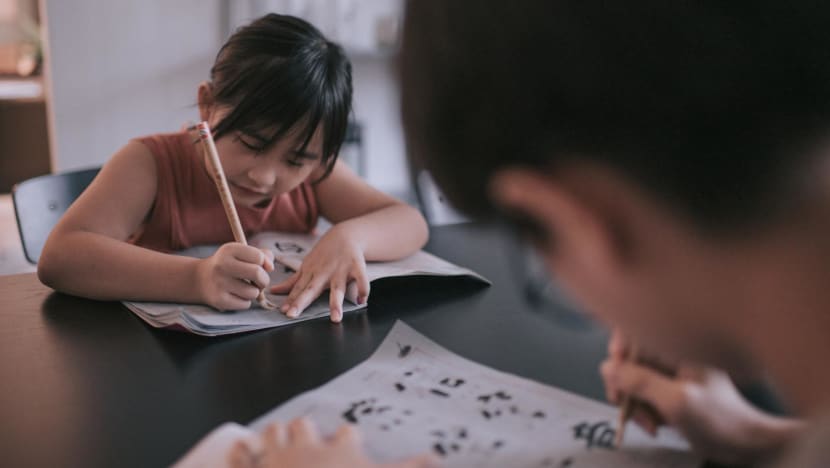Commentary: I failed Higher Mother Tongue, but I’ll encourage my children to take it up
After struggling with Higher Chinese all throughout secondary school, I now see it as a better way for my children to appreciate and learn the language, says mother-of-five Kelly Ang.

The author spent her adult life avoiding and dreading Chinese after failing it at O-Levels, but recently started to relearn the language again alongside her children. (Photo: iStock)

This audio is generated by an AI tool.
SINGAPORE: Every year, roughly one in five of Singapore’s secondary school students study their Mother Tongue at a higher level. Up until now, Higher Mother Tongue has been the domain of the top tier of Primary School Leaving Examination (PSLE) performers.
That could change in 2026, when more students will be allowed to take Higher Mother Tongue in secondary schools regardless of their overall PSLE score. When the time comes, I will encourage my children to do it if they can and want to.
Here’s why I even wish the option would be open to everyone regardless of grades.
MY COMPLICATED HIGHER CHINESE JOURNEY
Twenty-four years ago, I did well at the PSLE and was offered the opportunity to study Higher Chinese in secondary school. I grabbed the chance with both hands, motivated by the desire to read my favourite Japanese manga that were more widely available in Chinese translations.
I enjoyed it at first, revelling in the many opportunities for cultural immersion.
I remember going on an exchange programme in Secondary 2 to Yunnan, China – the very first time I'd been in an environment where the dominant mode of communication was Mandarin.
I remember calligraphy classes and competitions.
I remember being introduced to Chinese poetry. I was so taken by the lyrical quality of some verses that I memorised them without being told to.
I even remember being taught snippets of Chinese classics like Romance of the Three Kingdoms and Dream of the Red Chamber, and trying valiantly to read the whole texts on my own.
However, the pressure to perform really heated up in Secondary 3. My grades started slipping no matter what I did – private tuition, extra consultations with school teachers, memorising swathes of Chinese vocabulary.
I struggled with my exams. Eventually, I reached rock bottom with a definitive F9 for Higher Mother Tongue at the O-Levels.
Today, I still carry some of the trauma of failing so abjectly. I stutter when I attempt to speak to my children’s Chinese teachers, and I haven’t dared pick up a Chinese book since I left the language behind in junior college.
WHY HIGHER CHINESE, INSTEAD OF JUST CHINESE?
I forgot how beautiful Chinese is until recently, when I started to relearn the language again alongside my children, who often come home from pre-school with worksheets explaining the origins of Chinese words in cartoons or drawings.
Cheng yu are a personal favourite these days – idioms often derived from classical or historical origins. For example, I’d first learnt 饮水思源 (yin shui si yuan) decades ago, but coming across its meaning as an adult – “when you drink water, remember the source” – made me appreciate anew how evocative it truly is.
Exploring these idioms with my children often opens up organic conversations about the values that are important to us and compels us to connect with our cultural identity and heritage.
Learning Chinese at a “regular” level typically focuses on imparting functional langauge skills to students. But I’ve seen firsthand that Higher Mother Tongue can offer my kids a heightened cultural experience and exposure, as well as a deeper appreciation for how beautiful the language truly is and the history in which it’s rooted.
Of course, I worry about my children failing Higher Chinese and carrying negative feelings about the language like I did.
My eldest, now Primary 5, is currently struggling to maintain good grades in Higher Chinese himself. Even so, he tells me he’d like to continue with the subject if he’s offered it again next year.
He loves the opportunities it offers him outside of his schoolwork: Excursions to River Wonders to learn about pandas and their importance in Chinese culture, visiting tea houses to experience Chinese tea-making, and even a term-long workshop where they learnt to draw and write comics in Chinese.
Plenty of studies show how cultural immersion is far more effective at helping students become more interested and willing to learn languages.
This is what I hope will make all the difference in how my kids approach their mother tongue – with the desire to explore, rather than dread.
PRACTICAL BENEFITS OF GOOD MANDARIN SKILLS
I’m Singaporean, so of course I’m semi-practical about wanting my children to cultivate a healthy relationship with their mother tongue.
Going into my first job as an idealistic and bright-eyed fresh graduate with a degree in English Literature, I never gave a thought to my Mandarin fluency (or lack thereof).
But a few months in, I realised some older colleagues were more comfortable speaking in Mandarin. My fellow newbie coworkers who communicated with them in Mandarin were able to get the job done a lot more quickly and smoothly.
In my next job, I was required to read Chinese newspapers daily and summarise them where necessary. I also interviewed people, and I struggled with some of my older interviewees who were more comfortable speaking in Mandarin.
Having long felt handicapped by my inability to speak the language, it’s important to me that my children can use their mother tongue well.
FUNCTIONAL, NOT TEXTBOOK CHINESE
Looking back, I think my Chinese learning started to unravel because I didn’t think about the implications my poor language skills would have as an adult. I couldn’t see why I should be bothered to learn it properly just to read manga.
My parents were proudly English-speaking, so I adopted the same mindset early on, wearing my inability to speak Mandarin as a misplaced badge of honour. English just seemed “cooler” and I wasn’t alone, seeing as almost half of all Singapore residents now prefer it at home, too.
Call it the benefit of hindsight or just growing wiser with age, but when I became a parent, I decided that I wasn’t going to celebrate being monolingual.
Instead, here’s how I’m trying to encourage my five kids to develop a love for the language.
I try to read Chinese books following the adventures of the Monkey God or the Chinese Zodiac animals weekly to them, and doggedly add Chinese books, comics and magazines to our home library.
We’ve also started listening to Mandarin podcasts and music. On our morning drives to school, I’ve successfully gotten my girls – aged six, four and one – hooked on the soundtrack of animated film Frozen in Mandarin.
My two boys have been reading e-books on Dudu, a Chinese e-book platform. I make it a point to sit with them to listen in to the stories they read and help them with the questions they have to answer at the end of each story.
To help them keep up academically, I’ve enrolled some of my children into Chinese enrichment classes. As for the ones that don’t want extra classes, I’ve decided that I won’t force them. I don’t want unwanted pressure to kill any real interest they may have.
Is this enough to cultivate anything more than a perfunctory interest in the language?
Only time will tell – but at the very least, I hope my children will not struggle with their mother tongue as much as I did.
Kelly Ang is a mother of five and a freelance writer.


















